Thursday 9 December 2010
“There’s no telling what they’ll do! Girls are completely crazy, I find.”
—The Old Man, “Conrad goes too far”
There is a special challenge in writing interesting female characters in historical fiction—at least in places and periods where women were not on equal footing with men, which is pretty much everywhere, at every time.
If they’re too strong, too free-spirited, too rebellious, then they invite criticism as being inappropriate for the period—nothing but modern women in medieval clothing.
But if they strictly follow their period’s proprieties, then they risk appearing detestably weak-willed. Readers like a proactive heroine, not one who meekly endures whatever the men in her life ordain for her, and passively waits for men to save her.
What are powerful girls made of?
I can see two types of female protagonists that fit into the middle ground of interesting female characters who nevertheless fit seamlessly into their time period.
The first is the quietly strong woman who manages to stay within the prescribed role of womanhood. In medieval times that might be the matriarch, the no-nonsense midwife, the queen whose advice and support makes her invaluable to her husband, or the abused or poverty-stricken woman who holds her family together and keeps her children safe.
The second is the truly exceptional woman, in the literal sense of the word: that is, the woman who is an exception to the rules and roles of womanhood in her culture. These are the husband-poisoning merry widows, the seizers of thrones, the leaders of troops, the saints, the witches, the secretly-educated, the sexually adventuresome. There have always existed such women, and the reader must not be too quick to condemn every show of Girl Power as being anachronistic. After all, the truly exceptional people often have the most interesting stories, so we’re all the more likely to write about them.
Nevertheless it’s the responsibility of the author to create a character who could conceivably have sprung from her place and period. Her ideas must be the sort of thing a spirited girl could have come up with given her milieu and her education. Her aspirations must be believable. And the period-appropriate reactions of her family, friends, enemies, and others may be the most important factor in making her seem authentic. The higher she flies, the harder they will try to pull her back down.
Girl Power in Lothere
I always say I have a hard time writing interesting, dynamic female characters anyway. Perhaps I succeed better than I realize, but I can at least assure you that I find it more difficult than writing men.
That is why I am especially proud of those of my girls who really do leap from the virtual pages, some of them with sword in hand. There are some exceptional ladies in this story, both of the quietly strong and the irrepressibly spirited variety. These are my top 10 favorite moments of female awesomeness in Lothere.
10. Gwynn makes a low-cut, Gaelic-speaking triumph in “Condal is not the spectacle”
Published: April 20, 2009
Chapter Date: December 20, 1085
Synopsis: The young Lord Aed has come to Lothere and wants to visit his fair cousin Connie. Connie has been Gwynn’s “bosom friend” for the last few weeks, but Gwynn is beginning to feel jealous of Connie and her effortless conquests of older men—particularly the older man Gwynn had her eye on.Just as the girls are about to go meet Lord Aed, Gwynn pretends that she needs to run up to have her maid make a last-minute repair to her dress. In truth, Gwynn replaces her modest gown with a shockingly low-cut number which is, as far as Connie can tell, her nightgown with the bodice folded back.
Gwynn enters the hall just as Connie is making a stammering greeting to Lord Aed, and the gorgeous, vivacious, unsuspectedly Gaelic-speaking Gwynn casts Connie into the shade for the rest of the night.
I did want to have a Matilda moment in the Top 10, but I’m afraid Matilda’s most impressive moments were either some feather-brained scheme going awry, or just her being over-the-top (almost literally, when you look at the neckline of her famous gown).
As one of the first characters in this story, Matilda suffered from both my lack of a medieval-appropriate Sims wardrobe, and from my utter disregard of historical accuracy, due to a need to blast myself out of never ending research (for another time period, alas) and into sitting down and just writing.
However, Gwynn is just now coming of age, and with her I get a second chance at Matilda: smart and sexy, highborn, educated, and spoiled—and all too prone to meddling, with (she fondly believes) the best of intentions, and the most taffy-like of brains.
Gwynn later comes to regret her triumph of this night: she realizes she flew too high and singed her wings. But she is glorious and a little wicked while it lasts: first ditching Connie so that she can do a last-minute wardrobe change; then sashaying into the hall, pertly scolding Sigefrith, graciously greeting Lord Aed and his friends in Gaelic, and beaming out seduction-rays from her lily-white breast and most especially her smile. Finn has just finished making out with Connie and he already seems to have forgotten she exists:

In “Aed makes light of serious matters” we later learn that she made interesting enough conversation with Young Aed to have left him impressed with her intelligence, and even graciously corrected Gaethine when he made a slight error in quoting a line of Greek.
Gwynn knows she’s doing wrong, or she wouldn’t have felt the need to leave Connie out of her plans, nor to fudge the truth when Eadie questions the propriety of her dress. But even so, Gwynn so often feels insecure and self-critical that it is wonderful to see her bust out with all this confidence and sex appeal. Perhaps her reasons were not the best, but never has she so reminded us of Matilda. Sigefrith could hardly contain himself. “Name of God!” 

9. Ffraid stands up to the Royal Reeve in “Ffraid tangles with the third horseman”
Published: March 3, 2009
Chapter Date: December 19, 1085
Synopsis: Kraaia witnessed Lena’s murder and ran away from home, fearing she would get the blame. She nearly died in the snow, but a farmer found her and brought her to the house of the local healer, Ffraid. In this chapter, the Royal Reeve arrives to question Kraaia, and Ffraid does her almighty best to protect the girl.
Ffraid, we are slowly learning, is an exceptional woman of the second sort, hiding behind the persona of the first sort: a midwife and “wise woman,” meant to help ladies with childbirth and their little feminine cares, but meanwhile providing birth control and abortions to victimized women.
Her story is less rare than one might think at first—many historians agree that herbal recipes like “A treatment for retention of the monthly bleeding” are probably euphemisms for abortifacients—but Ffraid herself goes beyond being a mere dispenser of remedies. She’s angry and fierce and absolutely dauntless, standing up to tall elves, sleazy neighbors, and even, in this chapter, the Royal Reeve—and this, knowing that the Reeve could, if he cared to investigate, probably have her hanged.
“Don’t you dare talk to that little girl the way you just talked to me,” Ffraid warned him. The hoarse, throaty voice of her hatred was manlier than his. “Or the murder you’ll be looking into will be your own, by God’s name I swear.”
The reeve shrugged a shoulder and brushed his hair back out of his eyes, in the first gesture that suggested it might truly have been his.
“She’s bad hurt,” Ffraid muttered. “Bad, bad—and she’s suffered and despaired in ways you never could have known, or you’d never dare look another mortal in the eyes the way you’ve looked at me. Do you understand me?”
His brows lowered, and he looked at her strangely, as though he had only just noticed what manner of animal she truly was. His lips parted slightly, and his breath blew out of them in serpentine curls of pale fog, but he did not speak.
“Now, won’t you come in?” she growled. “You keep to your duties and leave my family out of this. And you better be gentle with that poor girl. She’s the scaredest little girl I ever saw.”
“I give you my word, goodwife,” the man said with a slight, stiff bow. “Naturally I defer to your experience in the matter of scared little girls.”
8. Eadie and Ogive act the queen in “Sigefrith lets the sentence stand”
Published: March 26, 2008
Chapter Date: December 11, 1085
There are two different kinds of Girl Power in this chapter, for two very different women.
First there is Queen Eadgith, meek and mild and merely gracious most of the time, finding the courage to ask a favor of her husband as Queen to her King: that he spare the life of a condemned murderer she has never even met.
When she begins her carefully-rehearsed speech, she is awkward and stuttering. She is a timid woman, and is making this request mainly because her brother Cedric secretly begged her to.
But Sigefrith soon realizes this and explodes with fury against Cedric. And that is when Eadie truly has occasion to impress.
At last the King said, “You are very brave to come here and make this request before us and all our men.”
…
“Then I wonder…” Sigefrith growled.
He rose from his throne slowly, almost imperceptibly, like a cat closing the distance it needed to pounce.
“…how it can be… that you have such a sneaking—craven—dog for a brother!”
He kicked his boot back against his empty throne as he stood up, knocking the heavy oaken chair against the wall with a bang that startled everyone in the room as well as if he had kicked each of them all at once.
…
Eadgith pleaded, “Sigefrith! Sigefrith! The Queen’s mercy for him!”
“The Queen’s mercy!” Sigefrith howled. “Save your mercy for a man who merits it! Save it for a man who kills his daughter’s rapist! Save it for a man who steals to feed his family! Not for this scoundrel! Where is his family to plead for him? Where are his friends? No one wants to see him live but this young idiot!”
He shoved Cedric roughly with one hand, and Cedric swayed like a boy about to pitch over in a faint.
“And he only to spare his guilty conscience! Selfish brat! There are laws in this country! I won’t teach men to break them and go begging mercy from you and your soft-hearted sister!”
“But, Sigefrith,” Eadgith whimpered. “He may yet repent…”
“He shall have plenty of time to repent in Hades!”
Suddenly Sigefrith’s waving arms fell limp at his sides, and he stared warily down at his wife.
“The Queen’s mercy,” he said darkly. “Never have I heard you offer it to a murderer before.”
Eadgith sucked her lower lip.
Ogive gathered all her will together to try to project silence onto the anxious Queen. If she said nothing, Ogive thought, the moment would pass, rolling over them and away like a storm.
But Eadgith spoke, Queen again, with this strange voice that was rich and deep and almost like a gentle man’s.
“Thus Your Majesty may know that it is truly offered—that no man in this kingdom may believe himself utterly unloved.”
This unrehearsed but heartfelt speech is perhaps Eadie’s finest moment so far as Queen. Sigefrith protests that no one cares what happens to “this scoundrel,” and Eadie responds by taking the condemned man under the mantle of her love.
Meanwhile young Ogive has been wincing all through this exchange:
Ogive winced, crinkling her nose into freckled pleats.
True, she thought it a noble sentiment, worthy of stories—of the old poetic sagas, perhaps, in which Christian queens, through their gracious examples, made Christian kings of their pagan husbands.
But this was the eleventh century of Our Lord, and Sigefrith of the Hwalas was no magnificent savage waiting to be tamed. On the contrary, he was a very modern, very prosaic, very pragmatic man, and such sentiments fell upon him and his men like seeds of charity sown upon a rock.
“Modern,” “prosaic,” and “practical” is not coincidentally how Miss Ogive might choose to describe herself.
In the following passage she is seeing a chance to break out with an Eadie-style bolt of Gracious Girl Power and save everyone from embarrassment:
Something was about to happen. Ogive imagined herself rising and going to the Queen’s aid, taking her graciously by the arm, murmuring some delicate excuse that would soothe the King and save everyone’s pride and good humor…
But Ogive was not a gracious or a delicate lady. She scarcely knew how to make herself agreeable. She could never smooth over anything sufficiently unpleasant to perturb a Sigefrith of the Hwalas. She did not stir, and the moment passed.
Ogive does not have the same kind of Girl Power as Eadie, but she has a different kind of her own. She doesn’t show it until the end, after Sigefrith has stormed out, leaving his court dazed and Eadie in tears.
He and Malcolm left without another word. There were the sounds of timid coughs and scuffing boots, and Aldwin and Ralf made much show of occupying themselves with their pens and papers, but even after the King had left no man seemed willing to be the first to speak.
Not one man offered an arm to the stunned Queen. Not one man dared commit himself even so much as by looking at her. Ogive had the sickening impression that she was seeing a ghost—that womankind had become invisible to all but womankind.
Ogive kicked her skirts straight and rose from her chair, all the more grandly since no man hastened to offer her a hand. She descended the stairs unaided, and took the Queen’s opposite elbow to turn her about as she passed. The little page slipped his grateful hand into hers and let himself be towed away.
Ogive led them both down the center of the hall, cloaking them with her cold dignity, since she lacked the grace wherewith to offer comfort.
Every man’s throat seemed to need clearing. Every man seemed to find something worth inspecting on the toe of his boot or the back of his sleeve.
It was not until she reached the reeve that she came up against an unflinching obstacle.
He did not quite bar the passage, but the three of them could not pass abreast if he did not step out of the way.
This problem did not seem to occur to him. Ogive suspected that every tensely twisted fibre of his male brain was too busy sneering at the folly of allowing women to attend to such matters as these.
“Thank you,” Ogive said chillingly, “but we are not in need of assistance.”
The reeve was not a timid man, and Ogive knew his slight smile was due less to nervousness than to amusement or even insolence. Nevertheless he stepped to the side.
“Gentlemen!” Ogive did not shout, and her voice was not shrill, but it pealed all the way back into the dark corner where the priest sat with the young Earl. “You are dismissed!”
7. Aia strangles Graybeard in “Aia uses her few words”
Published: November 8, 2010
Chapter Date: March 12, 1086
Synopsis: Aia likes to peek at the family of children that live near her cottage, loving them from afar. But on this afternoon she hears a man in the house assaulting the eldest child, a mere 12-year-old girl. Aia limps into the house and puts a stop to the assault by strangling the man to death.
This chapter makes the list as a sort of guilty pleasure. What Aia did makes me as uncomfortable as it does Alred. There’s both the vigilante justice on the one hand (Alred’s “I probably would have done the same thing, and yet…!”), and Aia’s weirdly calm behavior afterwards on the other, as if she doesn’t even realize that she has just done a shocking thing.
Killing people in a fit of rage is not generally the sort of “Girl Power” I want to celebrate, you see. And yet…!
Thus Aia must be the Girl Antihero of this story. There’s no denying she’s stuffed to the neck with Girl Power. Her sheer survival is already remarkable, in light of her many handicaps and the rotten treatment she has received from both elves and humans. Her handling of her violent, unpredictable lover Llen shows that she possesses enormous courage, stamina, cleverness, and quick-thinking. And best of all, she uses all her Super Powers to save children!
So here she is at #7: a startling example of Girl Power, but not for the squeamish.
6. Sigrid smuggles a knife into Eirik’s cell in “Eirik hatches a new hatred”
Published: November 17, 2007
Chapter Date: December 2, 1085
Sigrid shows such overwhelming Girl Power in this chapter that poor Eirik is almost unmanned.
We’ve just seen her stand up to Whitehand’s leering court in “Sigrid learns what men will do,” and she left the hall quivering with fear. But she’s not going to let Eirik know that. Throughout the entire chapter she stuns and shames Eirik with her courage as he gradually learns how she comes to be imprisoned with him. Here are some choice bits.
He leapt up from the bed and hurled his body against the bars, and when he stepped back to throw it forward a second time, he slipped his arm through and took all the force of the blow on his shoulder. And still his long arm was not long enough.
In his frantic attempts to protect her he might have broken his collarbone or more. The young man with her only laughed—and that lewd giggling in her ears was what Eirik could not bear.
But Sigrid herself put a halt to his struggles by calmly, firmly saying his name—“Eirik”—in such a tone that it was clear she would not say it twice, and he had better take heed. So she spoke to her sons when they misbehaved.
She stood straight and still, in spite of the grunting ape who swung from her arm, and no princess had ever held her head so proudly nor so high. Though nothing made sense to him, her eyes pleaded, “Trust me.” Eirik did.
She said, “Step back, Eirik,” softly but firmly, scarcely moving her head. “I’m to come in.“
Once locked inside his cell with him, she does not rush at him, but continues her stately advance.
“Be gentle, Eirik,” she whispered again, but this time through a dreamy smile. She seemed to want a kiss, but she scarcely tilted back her head, and from his height he could only lay his lips against her sweaty brow.
…
But Sigrid was not thinking of sweet things. She laid her head on his shoulder, near his ear, and hastily whispered, “Eirik! Don’t touch my hair. I think Skorri hid something in it. I can feel it rattling around in there, and I think it’s just about to fall out if we don’t do something.”
“Damn!” Eirik gasped. He tried to puzzle out the nature of this gift and the circumstances of its insertion, but in the end he only managed to splutter, “So, that is the last time I laugh at him and his magic tricks!”
“Shhh!”
She lifted her hand and, unseeing, sought out his mouth with her fingertips. Perhaps she only meant it as a warning, in spite of the English, but Eirik gently caught her fingers between his lips and held them for a moment—until he saw how the man outside had stopped giggling and was now watching them with the wide, white-eyed gaze of unholy hunger.
“So,” Sigrid whispered, still unseeing, “go sit on the bed, and I shall come kneel by you and put my head in your lap, and… pretend to…” She paused, meaningfully or shyly. “And meantime you shall take down my hair, and find what’s in there and hide it. It’s on my left side.”
Eirik stared over her shoulder at the strange man. “What about him?” he muttered.
“That’s why we’re pretending to.” She smashed her face into his neck, though she risked bumping her hair. “He wants to watch,” she mumbled.
After a convincing but fake demonstration of oral sex in front of their creepy captor, giving Eirik a chance to retrieve the key in her hair, Eirik pulls her up onto his lap and swears to himself that the farce is over. But Sigrid isn’t done surprising him yet.
“I have a knife,” she whispered.
“What?”
He was surprised enough that she was able to squirm out of his arms and turn to face him, kneeling over his lap.
“They searched me everywhere,” she whispered, “except for one place. We knew they wouldn’t! In my pad!” Even in the shadows her eyes were bright with defiance. “The wee knife Murchad gave me with the handle that fits over the blade! Just the thing! If I hadn’t—”
He yelped, “Siri!” and squeezed her more tightly than ever. The only living creature more precious than Sigrid with her baby was Sigrid without her baby. The only thing that hurt him more than pain was her pain. “Because of me?” he whimpered.
Sigrid struggled briefly in surprise, but she was quick to understand. “No! you silly pig-dog,” she whispered eagerly. “It’s not real. It’s Tryggve’s blood. When we saw the sails he cut himself and caught the blood in a cloth, and I folded it into a pad, and we hid the knife in it because we knew no man would ever touch that. Do you see?”
She smiled the overbright, overbroad smile of a child seeking reassurance. He could not let her think that what they had done was shameful or strange.
“That was a good idea, Siri,” he croaked.
Thus Eirik has to grope around beneath Sigrid’s skirts while their captor has his face pressed against the bars. It’s only after Eirik has the knife in his hand that Sigrid’s difficult work is done, and she allows herself to break down.
5. Sadb stands up to Old Aed in “Uallach’s world forever shatters”
Published: September 29, 2010
Chapter Date: March 8, 1086
Sadb is a girl to watch. Her many moments of Girl Power are often tainted by the fact that she is painfully naive about certain things, particularly about what men are really like. But she has the makings of a Great Lady.
What made me pick this one moment out of many of Sadb’s exploits is that it is unclouded by naivete—she is simply badass. Throughout this entire lengthy chapter, while Uallach whimpers like a terrified child and Orlaith howls in grief and rage, Sadb has seemed utterly despondent and never reacts to what’s happening around her, aside from a brief glance at Uallach.
Then, at the end, when she is on her knees trying to pray before the open casket of her murdered husband, Diarmait, with his sword belted on her hip, we suddenly have this:
And just when there was nothing left to react to, her father came to life and roared, “Enough!”
Even the shocked whispering stopped then. Outside, Uallach thought, even the wind died.
Without his cane, her father was obliged to creep painfully across the floor, shuffling with one foot and hopping on the other. He stepped closer to the dais, closer to Sadb, who kneeled in a rictus of prayer before him.
“Diarmait was a grown man!” her father cried. “His life was his to live! His death was his to die!”
He stooped. Uallach thought that he meant to pull Sadb to her feet, and not knowing the reason, she feared for her. Instead he grasped the hilt of Diarmait’s sword.
He pushed down, sending the silvered tip of the scabbard skittering across the dirt until he could cleanly draw the sword from behind Sadb’s back. Startled, Sadb twisted around and thumped onto her behind.
Uallach’s father lifted the sword high. He was about to slay Sadb. Sadb knew it, too, and put up her hands.
…
Uallach recalled a few words from months before, hanging together for an instant before they scattered, like beads slipping from a string: A man has no worse than the wife he deserves.
“And Aed of the Aenguses, too, is a grown man!” her father shouted, still holding the sword over his head. “And Eirik son of Olaf is a dog! Their lives are theirs to live, while they can! And their deaths are mine to deliver! By this sword, the sword of my son, on which I swear!”
Sadb said, “No!”
Uallach’s father’s eyes went wide. His cheeks turned purple above his beard.
“No!” Sadb repeated, her voice hoarse and shaking. “I claim that sword! I claim the right of vengeance—for my son!”
Uallach’s father’s arm sank. The tip of the sword slashed a long arc and finished hanging inches above the dirt. Her mother whimpered, “My son will have a child?”
Sadb sniffled and swallowed and sank back into a mound of stained golden skirts. She lowered her trembling arms until they lay in a protective curve over her belly: over Diarmait’s baby, and over the silver buckle of the belt that carried his sword.
Uallach’s father stooped and laid the sword in the dirt before Sadb’s tangled skirts, and creaking and wincing he stood tall again.
I want to give Orlaith a Girl Power Honorable Mention for this chapter, too. Yes, she is frightening in her treatment of Uallach, but then again she is a mother who has just learned of the murder of her eldest son—just seen his several-days-dead and slightly mutilated body exposed in the open coffin. So I won’t judge her harshly for being hysterical.
However, what I want to celebrate is the way she stands up to Old Aed. Nobody, it seems (except for Sadb now!), stands up to Old Aed. But here she is, reacting to Aed’s apparent indifference to the murder of his son.
…
She pointed at the coffin. She was addressing Uallach’s father now, sobbing, her face wet with tears and slimy with snot.
“Look! Look at what you’ve done to your son! You gave my daughter to a Norseman so this would not happen! You married my son to a Norsewoman so this would not happen! And when you could have sent aid to Diarmait so this would not happen—! Monster! You black monster with your heart of coal!”
Uallach looked to her father, breathless with shock. She had hosted Lala and Muirgel in her bed when their parents’ midnight conjugal disputes escalated to shrieks and slams and crashes, but she had never seen her own mother raise her voice against her father. Her world was forever shattered.
“And when Domnall—my son Domnall! Aye, I’m saying his name! When Domnall called you for what you were, you monster! you stone-hearted, graven image of a man! You sent him away! How many of my children must I lose before you’ll lift a finger? Her next?”
She grabbed Uallach’s arm, and Uallach squealed like a piglet strung up by its leg, expecting anything so long as it was bad. Her brother Donnchad sprang to her rescue, and, clucking and coaxing, convinced her mother to release her with surprising ease.
But her mother had gone out like a snuffed candle. She mumbled soundlessly with slippery lips and swayed her wet face blindly, seeking but not seeing—neither Uallach before her, nor Diarmait’s body at her side.
4. Gunnilda defends Alwy against Bertie in “Bertie learns how clever was his mother”
Published: September 6, 2006
Chapter Date: May 9, 1081
Bertie has just exploded at his father for snuggling up against his mother in spite of his mother’s apparent annoyance.
Bertie has learned that his parents married because his mother was already pregnant with him, and he blames his simple-minded father for seducing her, when she could have made a better marriage. When Gunnilda takes him to her bedroom to have a talk with him about his outburst, he reveals what he knows about his father’s selfish, calculating act. But he’s not expecting what comes next.
“I guess you think that was real low,” she said, still staring out at the yard.
“I guess I do! I guess it’s the only way he could have got a wife like you! But you should have got a better man, Ma.”
“I guess you think that was real mean and dishonest.”
“I guess I do!”
“I guess you can’t have much respect for someone who would do something like that.”
“I guess not!”
…
“Well, Bertie, I guess maybe you’re right. But you need to tell yourself that all those things you thought about your father, you need to start thinking them about me instead! Mean and dishonest and what all! That’s me!”
Bertie shook his head. He did not understand.
She stalked towards him as if she were in his pursuit. “You got it backwards, my boy! It’s your father who didn’t know what was what! It’s I who was real clever! That’s right! I was only fifteen, but I knew what I was doing! Eh, Bertie?” She laughed bitterly. “I picked out the man I wanted, and I got him! I made real sure of you first, and then I went and told my Da, and he made your father come and marry me. I guess Alwy was real happy about that after all, and I guess he still is to this day, but he no more knew what was happening to him then than do his pigs when he takes them out back to slaughter! And I guess he still doesn’t know, and it’s my great shame!”
Bertie wanted nothing so much as to cry. His dear, pretty little mother did not seem so pretty in her bitterness, nor so dear in her audacity, nor even so small in her anger.
“I don’t believe it,” he said. “You just say that so I’ll not think ill of him. You just—”
“Believe it! It’s true! And let it be a lesson to you! You’re not so clever but there isn’t some pretty girl out there more clever than you! It can happen to you, my boy!”
“I don’t believe it,” he muttered, but he did. His mother was clever and brave and strong, and if she had wanted to do such a thing, she could have. He went to sit on the edge of the bed. He was defeated.
“I don’t know but I guess you had better not tell this to your father,” she said more quietly, but no less firmly. “It won’t do him no good. But I guess you had better be real kind to him now to make up for all the times you didn’t respect him as you ought. A better, more honest man never lived.”
“But, Ma…”
“And don’t you ever again let me hear you say you wish you were never born. You alone already make up for everything I sometimes wish I could have had.”
“Ma…” He looked up at her, but he only caught a glimpse of the back of her head as she went out the door, and of her straight shoulders, and of her waist that was so trim and pretty in her tidy dress.
3. Margaret stumps Cynan with a curse in “Margaret speaks a prophecy”
Published: May 7, 2008
Chapter Date: December 12, 1085
Cynan is so rude at the dinner table and so heartless with Gwynn that Margaret is sorely tempted to crack her plate of stew over his head. Her good breeding wins out there, but she puts her quick wit to use to spare Gwynn’s feelings and give Cynan a set-down in another way.
Here Cynan has just learned that Margaret possesses the key to her grandmother’s old room in the family castle in Wales—a castle that would belong to Cynan’s father if he could regain his throne.
“It wouldn’t unlock anything anyway,” Cynan said.
“Are you certain?” Gwynn asked wistfully.
“What do you suppose?” Cynan laughed. “She left fifty years ago! Do you think we left a door standing locked all this time for lack of key? Do you think the Normans did?”
“I don’t know…”
“Her tower room all locked up for fifty years, with all her pretty things inside,” he sneered, “just as she left them, waiting for a girl to come with the key. No! Her room is probably a store-room now, full of barrels and dust and spiders!” He snorted and scooped a pile of mashed beans onto his fork. “A fairy tale castle indeed!”
Hetty was speechless and white, Dunstan looked hurt, and Cynewulf appeared confused at this unprecedented behavior. Margaret had sometimes thought Egelric could be gruff and even rude, but Cynan forced her to push out her definition of rudeness to such an extent that even Egelric edged into the range of polished gentleman.
And as for Gwynn…
…
With this, Gwynn was shattered. Cynan had aimed directly for the one romance of Gwynn’s life that had the advantage of being true—the story that had made their mother’s dark eyes shine—the tale that made Gwynn proud she was so tiny and of portable size, and proud of her Welsh name, and proud enough of who she was to go on stubbornly and a little stupidly being herself, in spite of the taunts of her sister and of certain boys.
Verily, Margaret thought, Cynan made even Finn seem a courteous man.
She saw she would have to do something—she could not allow Cynan the satisfaction of seeing Gwynn cry. If Cynan had kicked down and stomped all over Gwynn’s favorite fairy tale castle, Margaret would simply have to build her another—ferociously defended this time.
“It is not a door that it will unlock,” Margaret said, “but the castle.”
Cynan continued chewing, but he looked warily up at her with his bulldoggish eye. Margaret waited a moment for him to protest, but it appeared that the stubborn boy could spend some time chewing even beans that arrived in his mouth in the state of pre-chewed.
At last he swallowed, took a sip of wine, and said cuttingly, “There is a gatehouse there of remarkable size, not opened by a key that could be carried by a girl.”
Margaret waved her hand impatiently. “I don’t mean open it, open it. I mean, surely there is a curse upon the castle.”
Cynan rolled his eyes, but he was always slow enough to say anything that Margaret simply hurried on.
“Great-Grandfather was so heartbroken when Grandmother was stolen away, he must have laid a curse on the castle until Grandmother would be brought home again. And that is why her brother was never able to hold it, and why your father was never able to hold it, and why you never will be.”
“I do not believe in curses,” Cynan scowled.
“You didn’t believe in elves, either, until you came here,” Margaret said. “And just like elves, curses are even nastier when you don’t believe in them.”
“Fairy tales,” he scoffed.
“It is not a fairy tale—we have the key to prove it.”
Dunstan was looking wary, but Gwynn’s face was brightening slightly into a flush. She was beginning to see the romance of it.
“Mark my words, Cynan,” Margaret said, mustering all the eerie portent of the girls’ old games of play-acting Odysseus and Oracles. “No son of the line of old Iago will ever hold the castle for more than a year, until a daughter of the line returns with the key.”
“You are telling a fairy tale right now!” Cynan spluttered. “You are making it up right now!”
“Perhaps I am,” Margaret said with a mysterious smile. “But if there is a curse, the prophecy inhabits me. Who else could speak it but I? I am the granddaughter of Gwynn, and I hold the key.”
A smitten Cynan himself later praises Margaret for her cutting wit and her ability to think of just the right thing to say in the moment, rather than twelve hours later. An unintended side effect to be sure!
I never love Margaret more than when she is employing her Girl Power to come to the aid of her soft-hearted, taffy-brained sister, in spite of all the eye-rolling and fake-gagging it requires. ![]()
2. Estrid goes almost-naked to visit K in “Estrid is the craziest dream”
Published: March 1, 2009
Chapter Date: December 19, 1085
Estrid got in the last word in “Estrid is made molten,” but even so, she does not seem to come out of that conflict as the victor. When she went to see K the first time, she was nervous and uncertain, and things went much farther than she had wanted.
Furthermore she was embarrassed by the party dress that had seemed so beautiful in the safety of her bedroom, and mortified at the clunky riding boots she was wearing beneath it, once K started inching up her skirts.
She was shy and awkward, and it turned out to be a rather miserable, humiliating experience. So you would think that she would never show her face in that street of shops again.
But oh! Estrid comes back for Round Two, and knocks K flat.
The first part of the chapter is a bit painful to read, because (very Eirik-like!) she has obviously dreamt up this cruel, cutting speech to put this lowly tradesman in his place. Since it’s from K’s POV we begin to feel rather sorry for him.
But then Estrid reveals her true self, in every sense.
Kuntigern had never seen Brass-Dog, but he thought he would now recognize him on sight from behind. He would not have been surprised had she turned and opened her cloak to reveal a suit of mail, a sword, a dagger—even a delicately chased silver fork at the ready, with gilded tines.
Instead she was entirely naked.
The fire behind her gilded her silhouette but made her white body seem almost dim, like a cloud before the sun. Kuntigern squinted dazedly into the light and made out a pair of trim little breasts whose nipples had the same defiant tilt as her nose, a long waist, the thumb-sized dimple of a navel, and then a series of lines and curves and shadows all converging at a mouse-colored triangular tuft between her legs.
No, she was not naked—she had legs, long and white and so slender that the firelight glowing around either side almost met across her shins, and at the end of them a pair of heavy, wood-soled riding boots, lined with the wool of black sheep, and criss-crossed by pink laces.
“Pink laces!” he squeaked. “I never would have guessed!”
She hugged herself beneath her breasts and giggled delightedly, seeming for a moment a charmingly awkward and naive little girl. Then she lifted her arms at her sides like an angel about to take flight and said rapturously—and somehow a little tragically—“You make me laugh!”
It’s crazy, but it’s Girl Power for sure. And I love how she embraces the clunky boots that had embarrassed her so much the last time. Estrid has figured out that being sexy does not come from what you wear, but how you feel. And if she is going to wear something, well, I think that big stompy boots, wool from a black sheep, and pink laces are quintissentially Estrid!
1. Sigrid takes command in “Sigrid takes up the sword”
Published: November 12, 2007
Chapter Date: November 30, 1085
Sigrid is tired and nauseated from her pregnancy, and worried about Eirik’s absence. Tryggve, just returning, has taken command, and seems to have no intention of even discussing the situation with her, since he and the men have more important Man Things to do.
Tryggve turned again, and Sigrid screamed, “Stop right there!”
He stopped a moment with his back to her, perhaps trying to calm himself, but Sigrid could hear his panting from across the hall. In his rage he only seemed to swell before her eyes, his broad body rising and billowing up like a thunderhead.
…
Just as Tryggve turned to rush after her, she scampered up onto the dais Eirik had had built for her chair and his, and where Tryggve, it seemed, dared not yet follow.
…
“If my husband still lives, I am mistress here, and it is my husband’s men I am ordering around. And if he does not, then this hall is my son’s, and mistress I am here still.”
The men all looked to Tryggve with questioning eyes, just as her sons were looking to her.
“I did not swear any oath to you!” Tryggve growled.
Sigrid’s heart chattered like teeth. She was not brave. She was not a fit earl’s wife. She wanted to crawl down from the dais, creep beneath her blankets like Estrid’s cat in a thunderstorm, and cry, cry, cry out of longing for her husband. She needed Eirik to come and save Eirik for her.
But Eirik’s sons were watching her, and Tryggve’s resistance offered the strongest, surest support against which Sigrid could lean. She threw all her weight against it.
“Then do!” she cried. They both stood.
Knut sucked his breath in through his rounded lips in an almost-audible whistle.
“To a woman?” Tryggve asked with a softness to his voice that was chilling on him.
Sigrid spun about and dragged Eirik’s long sword down from its bracket. It was nearly as tall as she, and both lighter than it appeared and heavier than she could handle. In her fright and confusion it came down with a clatter.
Tryggve moved to catch it, but Sigrid’s sense of the sacredness of swords told her that she must not let any other man take it by the hilt. She pounced on it and lifted her head to glare a threat up at Tryggve, hissing in her throat like a cat. Tryggve stepped back.
Sigrid clutched one hand around the hilt as she rose, and with the other pushed herself up against the floor, against her knee, against the chair, as clumsy with this new weight as she would be in a few months with her baby. She had to hope her sons would not know her awkwardness.
Finally she lifted the tip from the floor and bore the weight of the sword on both her arms. Its length multiplied her every twitch into a sickening zigzag at the point of the blade, but Olaf was grinning proudly at her, as if he had never seen such swordsmanship.
Sigrid had never held a sword except in play, when she would squeal and giggle and pretend to be overwhelmed by the sheer masculinity of the thing. Now she was bearing a sword to a grave purpose, and now she felt the sacred power she had always suspected flowing back into her arms and shoulders.
There on Eirik’s lordly dais, with Eirik’s sword in her hands, she had the strength and self-assurance of a very tall, very noble, very powerful man. Eirik’s might was hers, since he was not there to bear it.
“If men call him Earl,” she cried, “and he is imprisoned for being Earl, and he is worth an Earl’s ransom, then I say he is Earl.”
His men looked to one another in astonishment at this scene, but no one seemed to disagree with her words. Even sullen-faced Tryggve was silent and listening.
“And I am his lady—and I am your lady, and you shall obey me when he is not here.”
Tryggve stared back at her, meeting her force with equal force, though she saw something in his eyes that resembled relief. Eirik had told her once that Tryggve was a fine captain but would make a poor commander—he always needed someone, somewhere, approving what he did or telling him what to do.
“Do not tarry,” she threatened. “We haven’t time, and I shall tell Eirik which of you hesitated and which of you swore boldly. And his sons shall witness.”
“I swear,” Knut shrugged, breaking the male silence. When they all looked at him, he explained, “Better to die for Sigi than die in bed, I guess.”
“Oh, if those are the only options…” Olaf Skeggi grumbled.
“Unless you have Eirik’s luck and can hope to do both at the same time,” Knut laughed.
“I swear,” Njal said. “I just don’t want her coming after me with that sword if I don’t.”
The men laughed at him, too, coming to life with the bold, ringing laughter of men among men.
Still, Sigrid was not satisfied. If Tryggve would not swear, it did not matter if the others did. He was Eirik’s right hand, and she was Eirik’s wife. Only he and she amongst all these ragtag warriors could claim any royal blood. Only Tryggve and she could have demanded oaths of loyalty from the men without provoking endlessly renewed bouts of jealous squabbling.
And while the men might follow Sigrid in Eirik’s absence, after Eirik’s death she and her sons would be pushed aside if Tryggve did not defend them. There could be no landed nobility among the people of the sea. Their only God-given right of inheritance was that of sons to avenge their father. They would have to earn back everything that had been his.
“Tryggve,” she said.
“I swear, Lady,” he replied. “Their blood and the blood of your husband shall be on your hands.“
She’s a worthy wife for Eirik here. Just as Eirik has become Earl by turning treachery in his favor and seizing the title by force of will, Sigrid is stepping beyond her role of brave little sea captain’s wife and literally taking command of a fleet of warships and a fort full of men.
As I mentioned in “The 10 Most Romantic Chapters of Lothere,” I find it unfortunate that their relationship seems to have regressed in the last months. The great lady who wielded her husband’s sword over the heads of her husband’s men is now hidden away at an undisclosed location with nothing to do but wait to give birth. I hope that Sigi will have a chance to use her Girl Power again soon.
Recap of the Top 10
- Sigrid takes command in “Sigrid takes up the sword”
- Estrid goes almost-naked to visit K in “Estrid is the craziest dream”
- Margaret stumps Cynan with a curse in “Margaret speaks a prophecy”
- Gunnilda defends Alwy against Bertie in “Bertie learns how clever was his mother”
- Sadb stands up to Old Aed in “Uallach’s world forever shatters”
- Sigrid smuggles a knife into Eirik’s cell in “Eirik hatches a new hatred”
- Aia strangles Graybeard in “Aia uses her few words”
- Eadie and Ogive act the queen in “Sigefrith lets the sentence stand”
- Ffraid stands up to the Royal Reeve in “Ffraid tangles with the third horseman”
- Gwynn makes a low-cut, Gaelic-speaking triumph in “Condal is not the spectacle”
Some Runners-up
- Kraaia takes Benedict to Colin before saving herself in “Kraaia gets into the accursed house”
- Margaret dismisses Leofric at the top of her lungs in “Leofric sees the daughter”
- Kraaia stabs Vash in “Kraaia smites Vash Almighty”
- Sophie kills Leofwine before Leofwine kills her in “Sophie makes a choice”
- Gunnora runs away and convinces Leofric to take her with him in “Leofric learns his calling”
What do you think? And what exploit of Matilda’s should have made the list? ![]()








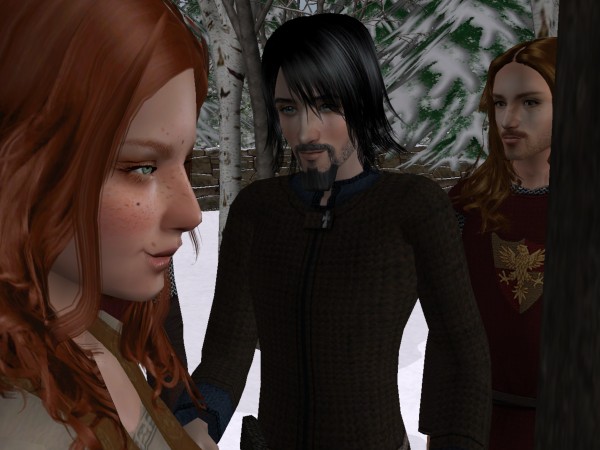


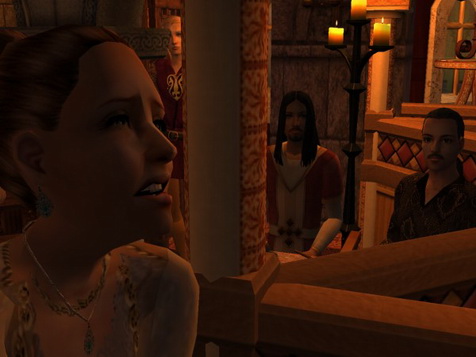
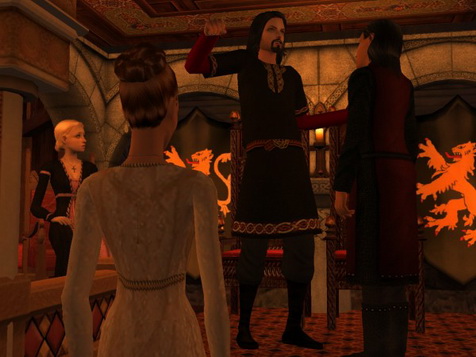
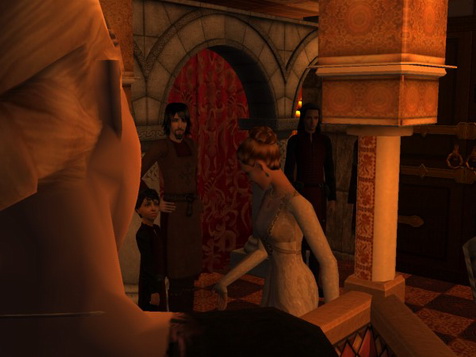
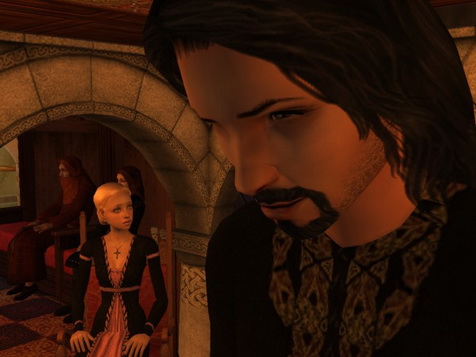

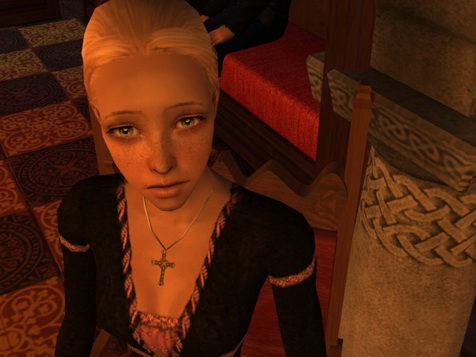



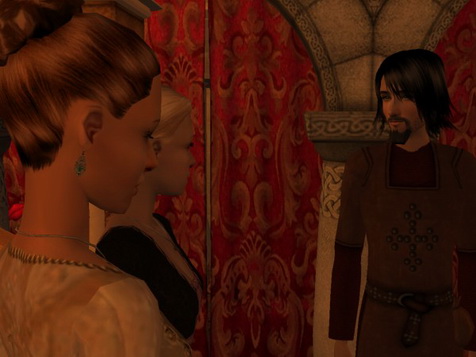

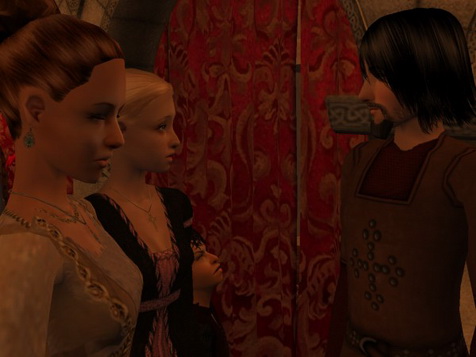

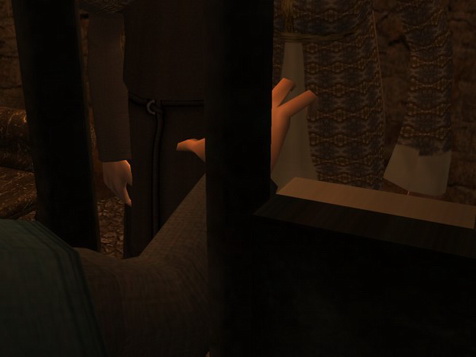
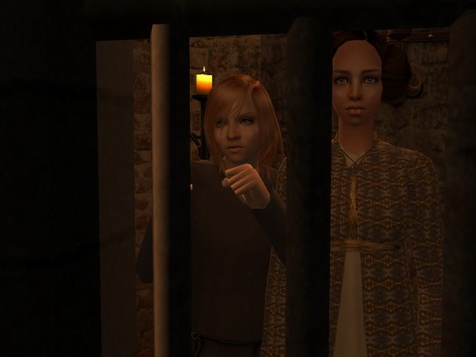
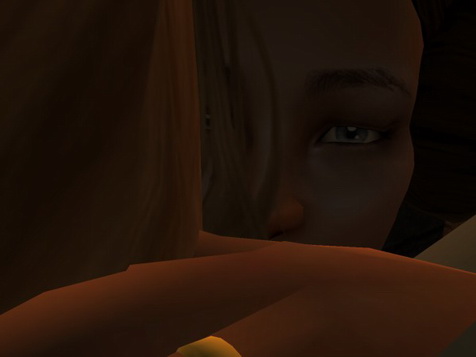
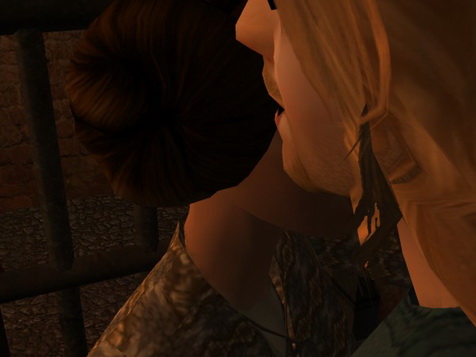
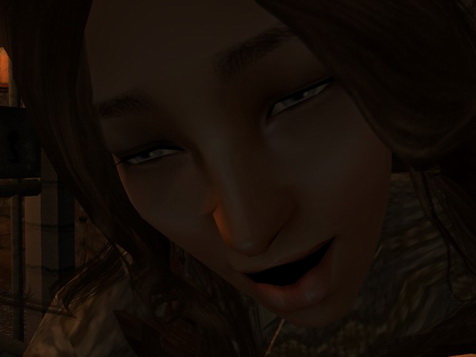
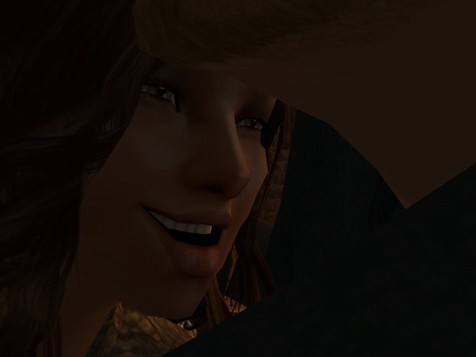



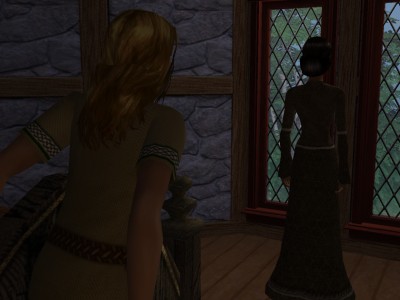
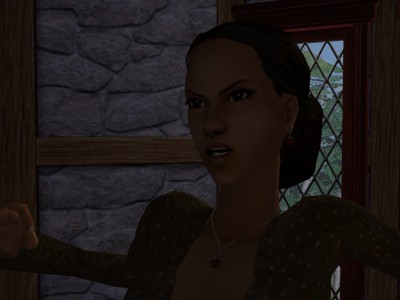
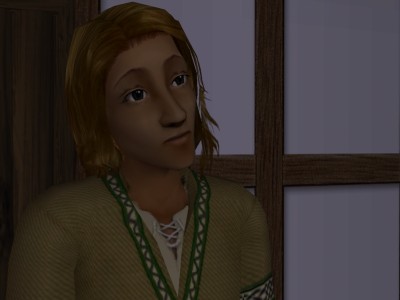
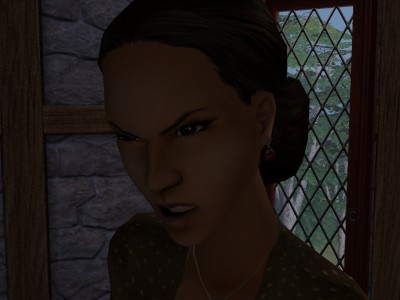
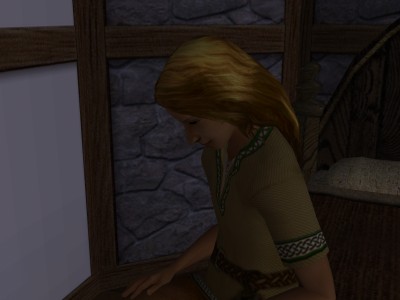
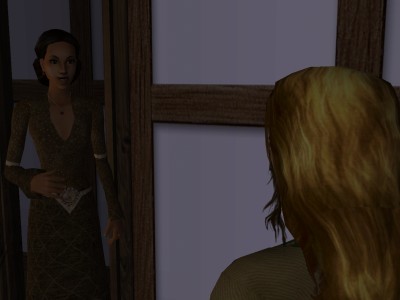

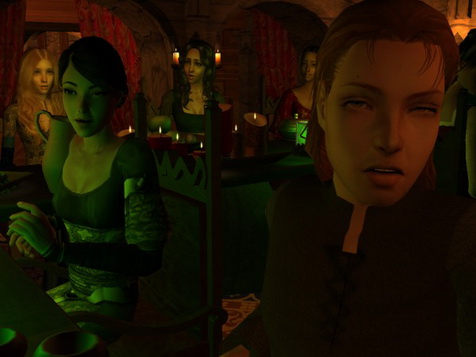
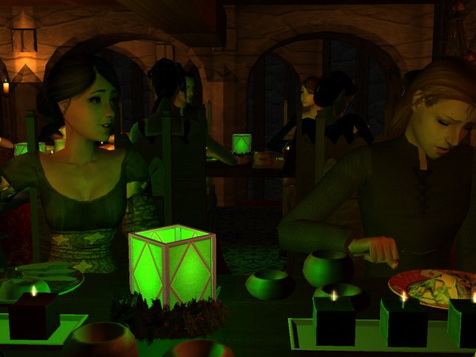

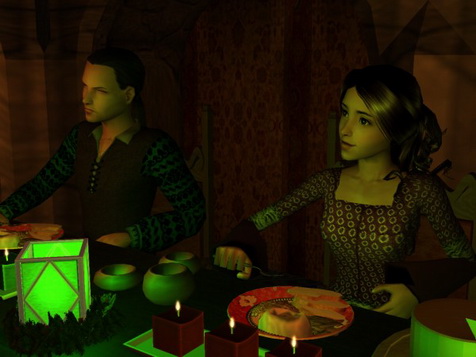
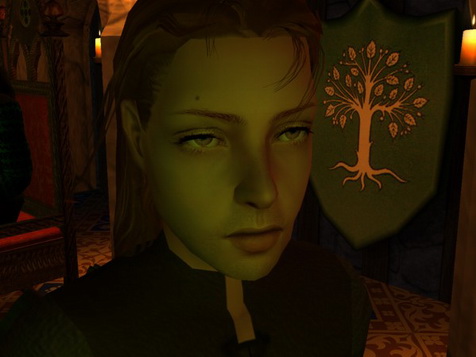
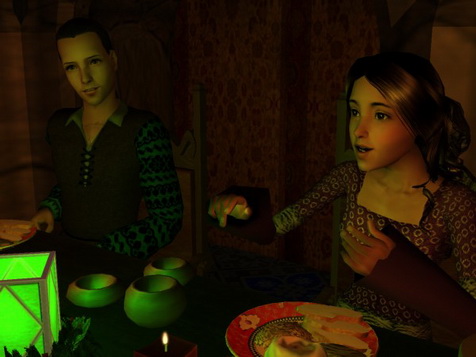

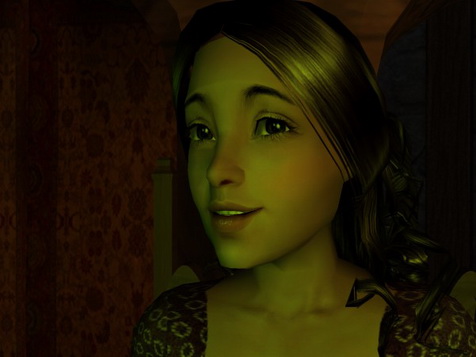
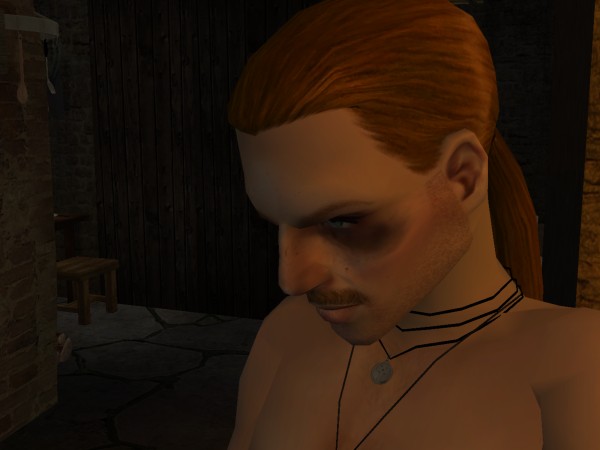
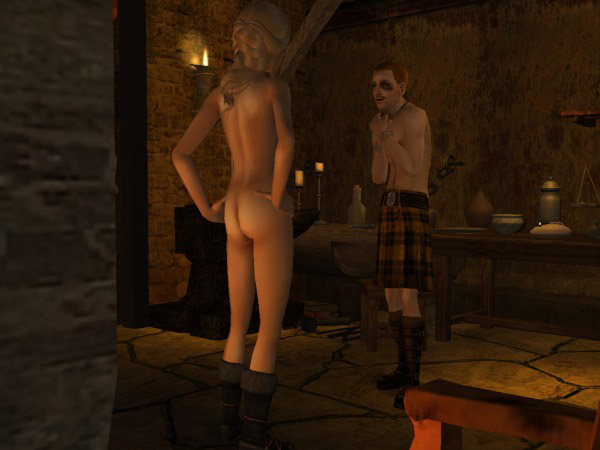
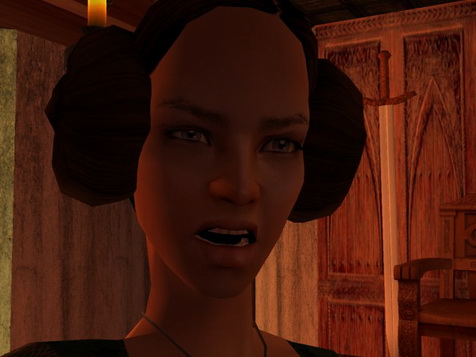


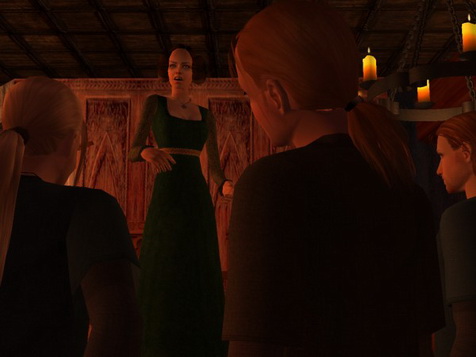

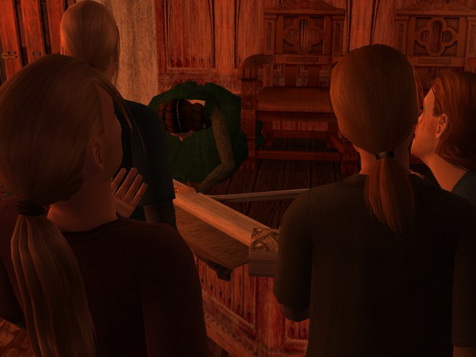


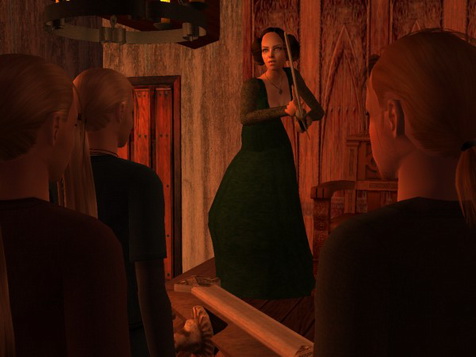
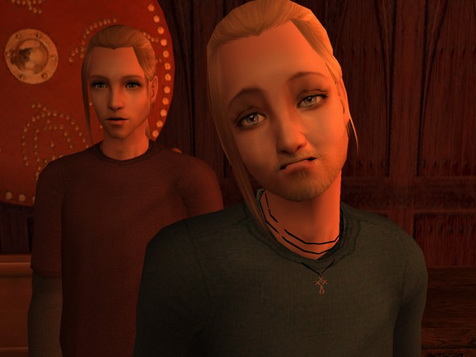
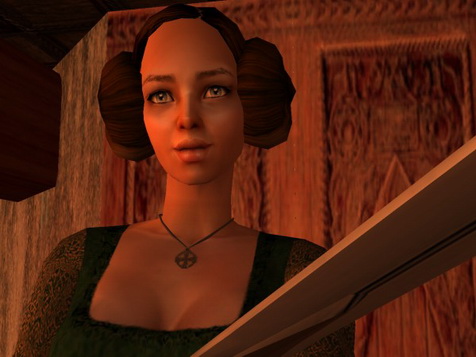

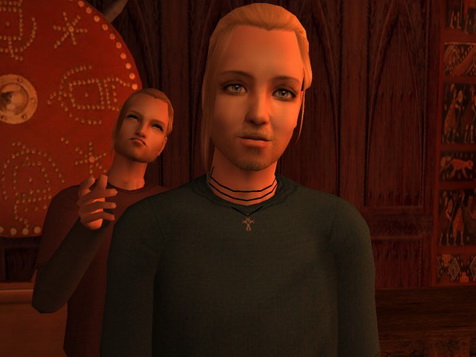



Fantastic. I love those moments of Girl Power. And Sigrid taking number one, with that chapter in particular, is just so right. Sigi stole my heart in that chapter. I just love her to pieces. And I’m sure her awesomeness will once again manifest itself. Perhaps she needs something to spur her to it, but I can’t see her just running after Eirik again, not when she nearly lost her precious baby.
As for Matilda…well, don’t get me wrong, she had Girl Power, but I don’t know that she ever had a MOMENT in the story where she demonstrated it so strongly. I think you hit the nail on the head with why she wasn’t in the top 10.
As much as you say you have a hard time writing interesting, dynamic female characters, some of my favorites are women. I think that you have some very interesting, very dynamic, very compelling female characters. Maybe in the past that was more true, but now we have Sigi, Sadb, Kraaia, Ogive, and of course, in their own quiet ways, Gunnilda, Eadie, Gwynn, Margaret…I could go on. What I’m saying though, is that each and every one of those women are different, unique, and awesome in their own ways. They aren’t caricatures, they are real people, with their own struggles and triumphs. They may be at a disadvantage by being women, but they are never boring.
So, I just want to say thanks again for writing characters who are so real. Especially ass-kicking women